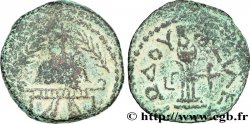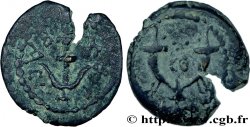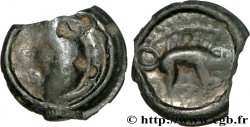- Accueil
- >
- >
v57_0196 - JUDAEA - HERODIAN KINGDOM - HEROD I Tetraprutah
MONNAIES 57 (2013)
Starting price : 195.00 €
Estimate : 300.00 €
Realised price : 195.00 €
Number of bids : 1
Maximum bid : 360.00 €
Starting price : 195.00 €
Estimate : 300.00 €
Realised price : 195.00 €
Number of bids : 1
Maximum bid : 360.00 €
Type : Tetraprutah
Date: an 3
Mint name / Town : Sébasté, Samarie
Metal : copper
Diameter : 20 mm
Orientation dies : 12 h.
Weight : 5,08 g.
Rarity : R2
Coments on the condition:
Exemplaire sur un petit flan à l’usure régulière, bien centré des deux côtés avec les grènetis visibles. Patine verte légèrement granuleuse
Obverse
Obverse legend : ANÉPIGRAPHE.
Obverse description : Bouclier macédonien.
Obverse legend : BASILEWS HRODOU/ LG
Reverse
Reverse description : Casque de prêtre ; dans le champ, monogramme de la Samarie.
Reverse legend : HRODOU BASILEWS/ LG- (TR)
Reverse translation : (Hérode roi, an 3).
Commentary
Poids léger. Les auteurs du Roman Provincial Coinage (RPC. 4901) ont recensé 3 exemplaires avec un poids moyen de 4,50 g et un diamètre moyen de 20 mm.
Light weight. The authors of the Roman Provincial Coinage (RPC. 4901) recorded 3 examples with an average weight of 4.50 g and an average diameter of 20 mm.
Light weight. The authors of the Roman Provincial Coinage (RPC. 4901) recorded 3 examples with an average weight of 4.50 g and an average diameter of 20 mm.








 Report a mistake
Report a mistake Print the page
Print the page Share my selection
Share my selection Ask a question
Ask a question Consign / sell
Consign / sell
 Full data
Full data







